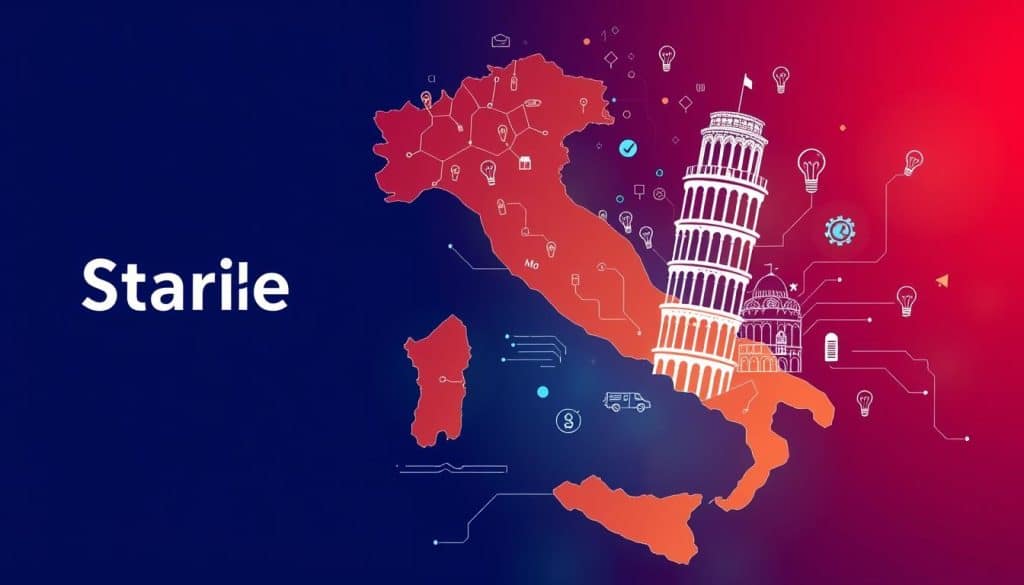Italy is becoming a great place for entrepreneurs to start a tech startup. The Italian startup guide shows more people are interested in innovation and technology. The government is also helping by starting new programs to support startups.
- Understanding the Italian Startup Landscape
- The Economic Environment in Italy
- Benefits of Starting a Tech Startup in Italy
- Legal and Regulatory Framework for Startups
- Taxation for Tech Startups in Italy
- Starting a Tech Startup in Italy
- Navigating the Italy Startup Visa
- Financing Your Startup in Italy
- Hiring and Managing Employees in Italy
- Building Your Network in the Italian Startup Ecosystem
- Challenges of Running a Startup in Italy
- Utilising Technology and Innovation for Success
- Success Stories of Italian Tech Startups
Even though Italy’s economy is slow, its culture and history still draw investors and tech fans. This makes Italy a good choice for starting a tech business.
Italy has a growing tech scene and lots of skilled people. This makes it a great place for tech startups, especially those making high-tech products and services. This guide will help you understand the legal, economic, and operational sides of starting a business in Italy. Let’s explore the exciting world of Italian startups together.
Key Takeaways
- Italy’s economy grew by 3.7% in 2022, but faces challenges ahead.
- The Italian startup scene supports innovation, especially with the Italia Startup Visa program.
- There are tax incentives for new businesses to help them grow.
- Italy offers great benefits for employees, making it easier to keep a stable team.
- Building a strong network is key to success in the Italian startup world.
- There are challenges, like rules and getting into the market.
- But, there are many success stories of thriving tech startups in Italy.
Understanding the Italian Startup Landscape

The Italian startup scene is special, blending rich culture with new tech. By October 2022, Italy had 14,708 startups, a 0.6% rise from the last quarter. The tech startup world in Italy saw $1.7 billion in venture capital in 2023. The total value of these startups is now $54 billion.
Cities like Milan and Rome are key for tech innovation. They make Italy a great place for startups to grow.
Business coaching helps startups deal with complex rules. It guides them to succeed in local markets and use resources wisely. Also, new investors like Exor Ventures and 2100 Ventures are backing fintech, SaaS, and climate tech.
The Economic Environment in Italy

The economic scene in Italy is lively, with both growth and hurdles. The country’s wholesale and retail trade grows about 1.75% each year, matching big European economies. Italy, the 8th biggest economy worldwide, is a key player in Europe. It shines in making luxury goods. The business climate shows strength, thanks to new policies for innovation and research. These policies are backed by 30.57 billion euros for digital skills
Yet, Italy’s growth is expected to slow down, with a GDP rise of just 1.2% next year. But, the tech startup scene in Italy is booming, with a 37% jump in startups since 2020. Venture capital hit over 1.2 billion euros in 2022, showing strong support for new businesses. Italy is focusing more on STEM education and teaming up with the private sector to boost its tech economy. As Italy works to improve its economic freedom, it’s becoming more appealing to entrepreneurs and investors.
Benefits of Starting a Tech Startup in Italy

Starting a tech startup in Italy has many benefits. The country’s vibrant culture and strong government support make it a great place for entrepreneurs. These factors help nurture innovation.
Italy has the 14th largest ecommerce market worldwide. This offers big opportunities for new businesses in various sectors. With a large consumer base that loves luxury and tech, there’s room to stand out.
The ecosystem in Italy supports creativity and innovation. The government has special visas for foreign entrepreneurs, like the Italian Startup Visa. This makes it easier to start a business and shows the startup’s potential to boost the economy.
Starting a business in Italy is also affordable, with costs around €2,000. This low barrier encourages people to chase their tech dreams. Italy’s location in the Mediterranean also helps with trade, making it easier to reach markets in Europe and beyond.
In summary, Italy is a great choice for tech entrepreneurs. It offers a vibrant market, government support, and a strategic location. These factors make starting a tech startup in Italy very appealing.
Legal and Regulatory Framework for Startups

Italy has a strong legal setup for startups. It makes sure they follow key rules. Choosing the right business structure is crucial for a startup’s success.
Types of Business Structures
Italy offers many business structures for startups. Each one meets different needs and goals. Here are some common ones:
- Sole Proprietorship (Impresa Individuale)
- Partnership (Società di Persone)
- Limited Liability Company (Società a Responsabilità Limitata)
- Joint-Stock Company (Società per Azioni)
Many startups choose the Limited Liability Company (SRL) for its benefits. The Simplified Limited Liability Company (SRLS) is great for small startups. It’s fast and affordable.
Necessary Legal Documentation
Starting a business in Italy involves several important steps. You need to:
- Draft Articles of Association with notaries.
- Get a tax code for financial activities.
- Register with the Chambers of Commerce.
Also, businesses must meet financial rules. For example, they need at least €50,000 in investment. This can come from venture capital or crowdfunding. It shows the need to understand laws and use resources wisely for growth.
Taxation for Tech Startups in Italy

Understanding taxes for tech startups in Italy is key to staying compliant and improving finances. Knowing about corporate taxes and tax breaks can greatly help a startup’s finances.
Key Taxes to Consider
Italy’s tax system has several important taxes for tech startups. The Corporate Income Tax (IRES) is 24%, down from 27.5% in FY 2016. The Regional Production Tax (IRAP) is about 3.9% but can change by region. Startups must remember that IRES is based on worldwide income for entities in Italy, affecting their global work.
In the financial sector, different IRAP rates apply to banks and insurance companies. This shows the need for tax advice specific to each sector.
Tax Incentives for New Businesses
Italy has many tax breaks for new businesses to ease their financial load. There are flat-rate schemes to lower taxes for innovative startups. The Reshoring initiative gives reduced taxes of 50% of income for five years for businesses moving to Italy from outside the EU.
Employers get more deductions on labour costs for new hires. The Patent Box initiative offers tax deductions up to 210% for R&D expenses. These incentives show Italy’s support for innovation in the market.
Starting a Tech Startup in Italy

Starting a tech startup in Italy means knowing the key steps. Major cities like Milan are great for digital businesses. They are followed by Rome, Turin, and Bologna, which are good for developers and startups.
When starting a business in Italy, you need to do market research. You must understand what customers want and follow the rules. Working with local partners and experts helps a lot in the Italian market.
Web developers in Italy make about €24,470 a year. Mobile app developers earn around €30,000. The country has many skilled graduates from top universities like the University of Bologna and Politecnico di Milano. This helps the startup scene a lot.
Getting money is important, too. Recently, 22 Travel Tech startups got $71.2 million. This shows the strong investment in the sector. On average, each startup got about $3.2 million. This is great for growing and innovating.
Italy’s tech scene is changing fast. Fintech, greentech, and healthtech are leading the way in new startups. The government helps startups with tax breaks and exemptions. This encourages more businesses to start in Italy.
Navigating the Italy Startup Visa

The Italy Startup Visa aims to draw in innovative entrepreneurs from outside the EU. It helps them enter the Italian market. Since June 2014, it has supported startups in tech and innovation. To apply, entrepreneurs need to know the criteria and application process.
Eligibility Criteria for Applicants
Applicants must show they have at least 50,000 euros for their startup. Those investing in existing startups need 100,000 euros. A detailed business plan is key, outlining the startup’s goals and strategies.
Also, having the right education and work experience is important. It shows you’re ready to run the startup.
Application Steps and Required Documentation
Applying for the visa involves several steps. First, you need a solid business plan that shows growth and market plans. Then, you must get support from a certified startup incubator or facilitator.
You’ll need to provide financial proof, a Job Agreement, and business registration confirmation. You can apply yourself or with the help of a startup incubator. They offer different levels of support, from emails to web calls.
Financing Your Startup in Italy

Getting funding is key when starting a tech business in Italy. There are many funding options, fitting different needs and areas. Government grants in Italy are vital for many startups to begin and innovate.
These grants have specific rules. They make sure the money goes to projects that help the economy.
Government Grants and Incentives
The ‘Nuova Sabatini’ programme helps small businesses. It supports investments in new tech and equipment. This makes Italy’s manufacturing sector more competitive.
Social enterprises and cooperatives get special help. This shows Italy’s commitment to social projects. The ‘Guarantee Fund for Small and Medium-Sized Enterprises’ helps with loans. It’s a big help for those looking for funding in Italy.
For businesses hit by tough times, there are subsidies. These include zero-rate loans up to EUR 500,000. They offer crucial support.
Private Investment and Venture Capital
Venture capital is important for tech startups in Italy. The Smart&Start initiative gives loans up to EUR 1.5 million. These loans are interest-free and can be paid back over ten years.
There’s extra help for certain businesses. This includes those with PhD holders or women founders. The Green New Deal also supports R&D projects. It offers grants and soft loans, boosting private investment and teamwork.
Hiring and Managing Employees in Italy

Recruiting and supervising staff in Italy needs a good understanding of local employment laws. These laws cover hiring practices and contract types. Knowing them well helps create a productive work environment and ensures legal compliance.
Understanding Employment Contracts
In Italy, you must create an employment contract to define the work relationship. There are permanent, fixed-term, and part-time contracts. The standard workweek is 40 hours, with overtime for extra hours.
Italy doesn’t have a minimum salary law. Employers must rely on collective bargaining agreements for salary terms. Probationary periods vary from 45 to 60 days for non-managers, and up to six months for executives.
Labour Laws and Employee Rights
Italian labour laws protect employee rights well. They include leave for annual, sick, maternity, and paternity. Employers also have to pay for social security, pension, and severance costs, adding 33-40% to the hiring cost.
Discrimination laws prevent unfair treatment based on gender, race, or disability. Companies must also give a severance payment of 6.91% of the employee’s monthly earnings if employment ends.
Building Your Network in the Italian Startup Ecosystem

Building a strong network in Italy’s startup world is key for entrepreneurs. It’s about connecting with local incubators and going to industry events. Milan, for example, is booming with tech startups, thanks to its culture and growing investor interest.
There are many initiatives to help startups, like tax breaks and funding programs. These attract talent from all over.
By making connections in Italy, entrepreneurs can find mentors and investors. This helps them get the funding they need to grow. In 2022, Italian startups’ value hit 33 billion Euros, up from 21 billion in 2021.
There are 229 incubators and accelerators by the end of 2021. This means startups have lots of support options.
Milan’s location makes it a top spot for tech startups. It’s close to big cities like London and Berlin, drawing investors and entrepreneurs worldwide.
Events like “Innovation Pulse: Europe’s Power Network” are great for making connections. They bring together investors, founders, and researchers. They also highlight the latest trends in startups.
Challenges of Running a Startup in Italy

Starting a business in Italy comes with many challenges. These obstacles can greatly affect a startup’s success. Issues include cultural differences and market entry problems.
Cultural Considerations
Italy’s culture can affect how you run your startup. It’s key to understand the local way of doing business. Knowing the local mindset helps in planning your market strategy.
Successful startups get to know Italy’s social norms. This knowledge helps them tailor their marketing. It also helps them connect better with their audience.
Market Entry Barriers
The Italian market is tough for new businesses. You need a solid business plan to get funding and deal with rules. The cost of starting a business is also high because of red tape and complex laws.
Startups must be persistent and strategic. They should also use the internet to reach more people.
Utilising Technology and Innovation for Success

Success in the tech startup world depends a lot on using technology and being innovative. Italy’s tech scene is buzzing with opportunities for entrepreneurs. New tech can make things run smoother, engage customers better, and improve products.
Startups in Italy get a big boost from funding. The country is eighth in Europe for venture capital. This money helps startups use technology to reach their goals. Italy also has a strong economy and a big market, which is great for growth.
The Italian government is also helping out. They’ve put €1 billion into a programme for startups in 2020. This support, along with Italy’s innovative spirit, makes it a great place for new businesses.
Using new tech means startups need to find local talent. Italy is working on programmes to attract more tech talent. Having skilled people is key to staying ahead in the market.
In short, using technology and innovation is crucial for success in Italy’s tech scene. By using tech wisely and getting funding, startups can grow and stay competitive in a changing market.
Success Stories of Italian Tech Startups
Italy’s tech scene is changing fast, thanks to startups like Scalapay and Satispay. They became unicorns, valued at $1 billion last year. Their success draws global attention and shows Italy’s growth potential.
These entrepreneurs mix innovation with smart networking. They set high standards for others to follow. This is inspiring for those starting their own businesses.
The Italian Founders Fund is key in this growth. It has €50 million to back 25 startups. It offers money and advice, helping companies like Jet HR and Glaut grow.
This fund is supported by industry leaders. It shows how teamwork can help new businesses thrive.
Even with a 53% drop in venture capital last year, success is still possible. Institutions are creating new companies, and Exor Ventures is using private wealth to help. This sets the stage for more startup success stories.
These stories show Italy’s tech sector is strong and innovative. They encourage future entrepreneurs to keep pushing boundaries.

